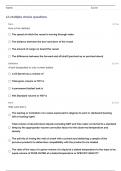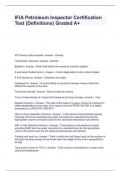Petroleum - Study guides, Class notes & Summaries
Looking for the best study guides, study notes and summaries about Petroleum? On this page you'll find 6109 study documents about Petroleum.
Page 4 out of 6.109 results
Sort by
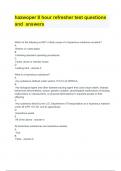
-
hazwoper 8 hour refresher test questions and answers
- Exam (elaborations) • 71 pages • 2024
- Available in package deal
-
- $7.99
- 1x sold
- + learn more
Which of the following is NOT a likely cause of a hazardous substance accident? A Broken or rusted pipes B Following standard operating procedures C Faulty valves or transfer hoses D Leaking tank - answer-b What is a hazardous substance? A Any substance defined under section 101(14) of CERCLA B Any biological agent and other disease-causing agent that could cause death, disease, behavioral abnormalities, cancer, genetic mutation, physiological malfunctions (including...
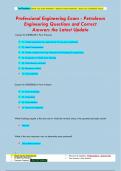
-
Professional Engineering Exam - Petroleum Engineering Questions and Correct Answers the Latest Update
- Exam (elaborations) • 49 pages • 2024
- Available in package deal
-
- $14.09
- + learn more
Causes for INCREASE in Pore Pressure 1). Undercompaction by rapid burial of low-perm sediments 2). lateral compression 3). Water release from clay minerals from heating & compression 4). Expansion of fluids from heating 5). Fluid density contrasts 6). Buoyancy effects 7). Fluid injection Causes for DECREASE in Pore Pressure 1). Fluid shrinkage 2). Unloading 3). Rock dilation 4). Reservoir depletion Which faulting regime is the only one in which the vertical stress is the ...
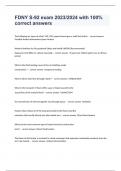
-
FDNY S-92 exam 2023/2024 with 100% correct answers
- Exam (elaborations) • 11 pages • 2023
-
- $17.49
- 4x sold
- + learn more
The following are types of what? LPG, CNG, piped natural gas or solid fuel (coke). - correct answer Portable fueled salamanders/space heaters National Institute for Occupational Safety and Health (NIOSH) Recommended Exposure Limit (REL) for carbon monoxide - correct answer 35 parts per million (ppm) over an 8 hour period What is the third leading cause of fires in buildings under construction ? - correct answer temporary heating What is direct heat flow through matter? - correc...
IFIA Petroleum Inspector Certification Test (Definitions) Graded A+
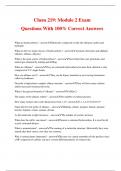
-
Chem 219: Module 2 Exam Questions With 100% Correct Answers
- Exam (elaborations) • 12 pages • 2024
- Available in package deal
-
- $12.49
- 4x sold
- + learn more
Chem 219: Module 2 Exam Questions With 100% Correct Answers What are hydrocarbons? - answerMolecules composed of only the elements carbon and hydrogen What are the two major classes of hydrocarbons? - answerAromatic (benzene) and aliphatic (alkanes, alkenes, alkynes) What is the main source of hydrocarbons? - answerFossil fuels like coal, petroleum, and natural gas obtained by mining and drilling. What are Alkanes? - answerThey are saturated hydrocarbons because their skeleton is only c...
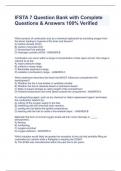
-
IFSTA 7 Question Bank with Complete Questions & Answers 100% Verified
- Exam (elaborations) • 15 pages • 2023
- Available in package deal
-
- $10.99
- 2x sold
- + learn more
Combustion can occur within a range of concentration of fuel vapor and air; this range is referred to as the: A) vapor pressure range. B) surface to mass range. C) flammable (explosive) range. D) oxidation (combustion) range. - ANSWER-C Which statement describes the factor that MOST influences compartment fire development? A) Whether the fire is fuel-limited or ventilation-limited B) Whether the fuel is cellulose-based or petroleum-based C) Ratio of square footage to ceiling height of ...
IFIA Petroleum Inspector Certification Test (Definitions) Graded A+
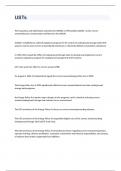
-
USTs exam 2024 with 100% correct answers
- Exam (elaborations) • 16 pages • 2024
- Available in package deal
-
- $16.99
- 1x sold
- + learn more
The Hazardous and Solid Waste Amendments (HSWA) of 1984 added Subtitle I to the correct answersResource Conservation and Recovery Act (RCRA). Subtitle I established a national regulatory program for the control of underground storage tank (UST) systems used to store correct answersliquid petroleum or chemicals defined as hazardous substances. In 1985, EPA created the Office of Underground Storage Tanks to develop and implement correct answersa regulatory program for underground storage tan...
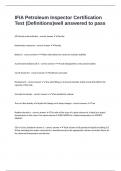
-
IFIA Petroleum Inspector Certification Test (Definitions)well answered to pass
- Exam (elaborations) • 4 pages • 2024
- Available in package deal
-
- $11.49
- + learn more
IFIA Petroleum Inspector Certification Test (Definitions)well answered to pass
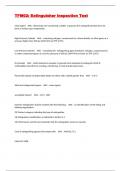
-
TFM02: Extinguisher Inspection Test with correct answers
- Exam (elaborations) • 15 pages • 2024
- Available in package deal
-
- $11.99
- 2x sold
- + learn more
Clean Agent ANS: - Electrically non-conducting, volatile, or gaseous fire extinguishant that does not leave a residue upon evaporation. High-Pressure Cylinder ANS: - containing nitrogen, compressed air, carbon dioxide, or other gases at a pressure higher than 500 psi (3447 kPa) at 70°F (21°C). Low-Pressure Cylinder ANS: - containing fire- extinguishing agent (medium), nitrogen, compressed air, or other compressed gases at a service pressure of 500 psi (3447 kPa) or lower at 70°...

How did he do that? By selling his study resources on Stuvia. Try it yourself! Discover all about earning on Stuvia

